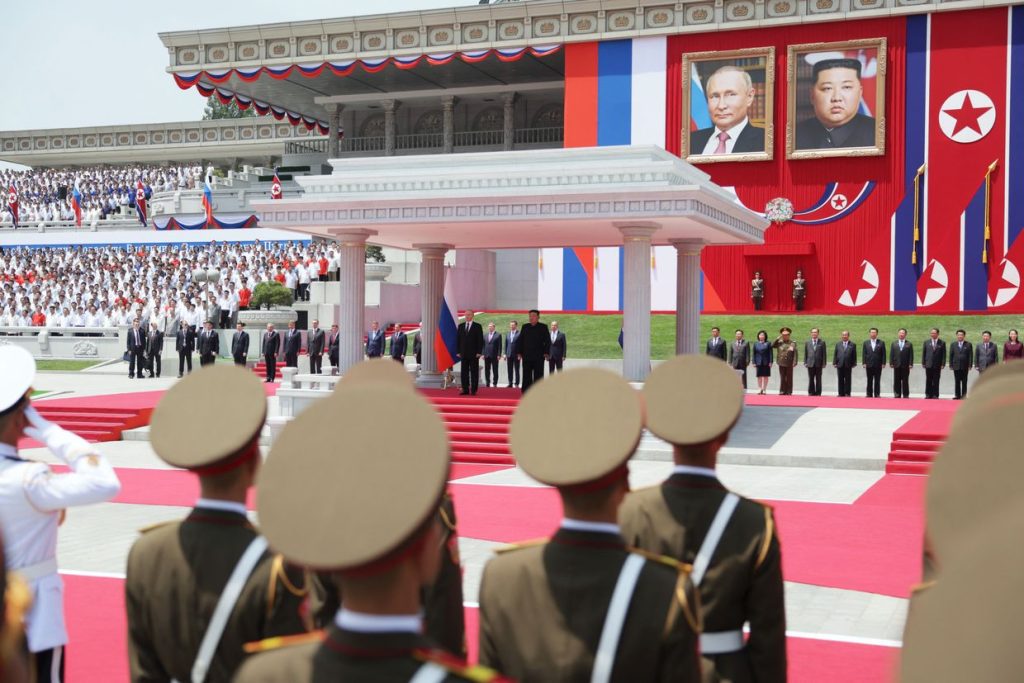China has denied knowledge of any North Korean troops inside Russia preparing to join Moscow’s invasion of Ukraine, despite confirmation from the U.S., South Korea, and Ukraine. The U.S. publicly confirmed the presence of North Korean soldiers in Russia, stating that they would be considered fair targets if they joined the conflict in Ukraine. President Volodymyr Zelensky of Ukraine reported that two North Korean brigades of up to 6,000 personnel each are undergoing training in Russia, with some North Korean officers already in occupied territories. North Korea has denied these reports, while a Kremlin spokesperson gave an evasive response. There have been reports of North Korean soldiers abandoning their positions in Russia, and video footage purportedly showing North Korean troops at a Russian military training camp.
The situation has escalated with reports of North Korean pilots being dispatched to join the war in Ukraine, potentially flying Russian warplanes. South Korea is considering sending personnel to Ukraine to monitor North Korean troops. Despite the denials from North Korea and the evasive response from Russia, there is mounting evidence of North Korean involvement in the conflict. The U.S., South Korea, and Ukraine have all provided confirmations of the presence of North Korean troops in Russia, indicating a coordinated effort to support Moscow’s invasion of Ukraine. The international community is closely monitoring the situation and calling for a de-escalation of the conflict in Ukraine.
The presence of North Korean troops in Russia and their potential involvement in the conflict in Ukraine raises significant concerns about the international implications of the crisis. The U.S. National Security Council has stated that if North Korean soldiers deploy to fight against Ukraine, they will be considered fair targets by the Ukrainian military. This underscores the complexity of the conflict and the interconnected nature of global alliances. The involvement of North Korean troops in a conflict thousands of miles away from their homeland highlights the extent to which geopolitical interests can intersect and complicate regional conflicts.
The reports of North Korean troops training in Russia and potentially joining the conflict in Ukraine add a new dimension to the already volatile situation in Eastern Europe. The international community is grappling with the implications of North Korean involvement in the conflict, as it could further escalate tensions and complicate efforts to reach a peaceful resolution. The presence of North Korean soldiers in a conflict thousands of miles away from the Korean Peninsula underscores the global reach of regional conflicts and the interconnectedness of international politics. As the crisis in Ukraine continues to unfold, the role of North Korea in supporting Moscow’s invasion could have far-reaching consequences for regional stability and global security.
The reports of North Korean troops in Russia have sparked concerns about the motivations behind their involvement in the conflict in Ukraine. Despite denials from North Korea and evasive responses from Russia, the mounting evidence of North Korean soldiers in Russia points to a coordinated effort to support Moscow’s invasion. The international community is closely monitoring the situation and urging all parties involved to de-escalate tensions and seek a political solution to the crisis in Ukraine. The presence of North Korean troops in a conflict zone thousands of miles away from their homeland highlights the complex nature of modern warfare and the potential for regional conflicts to have global implications.
As the situation in Ukraine continues to unfold, the involvement of North Korean troops in Russia raises questions about the broader implications of the conflict and the potential for further escalation. The presence of North Korean soldiers training in Russia and potentially joining the war in Ukraine adds a new layer of complexity to an already volatile situation. The international community is closely watching developments and urging all parties to exercise restraint and work towards a peaceful resolution. The role of North Korea in supporting Moscow’s invasion of Ukraine underscores the interconnected nature of global conflicts and the need for diplomatic solutions to prevent further destabilization in the region.














